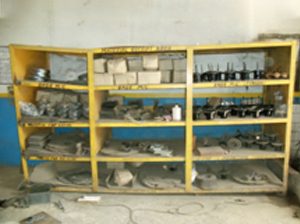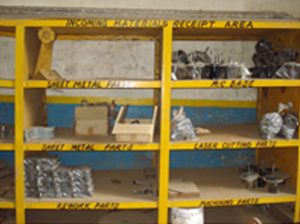Managing Growth through Workplace Cooperation – the case of Champion Components
Case Study
Case in point
Company Profile
Name: Champion Components (P) Ltd.
Location: Faridabad, India
Established: 1967
Current size: 85 employees
Products: Sheet Metal Components & Engineering Fabrications for automobile, construction and agricultural sectors
Customer: Earth moving equipment OEM’s
Management Vision
Champion Components (P) Ltd is a family owned business founded by Mr. SC Bhatia in 1967 as a small scale unit to produce fabricated engineering components. With his fortitude and determination, he turned the small company into a leading light engineering industry of Faridabad.
Today the company is producing sophisticated engineering components for automotive, cement and agricultural farm equipment sectors. The company has the distinction of delivering quality products to its customers since last four decades. Today the company is managed by a team of three young directors who are having good experiences & qualified professionals.
The young management is genuinely interested in bringing world class manufacturing (WCM) practices. Before subscribing to SCORE program, for a year, they participated in the LEAN cluster program run by National Productivity Council (NPC) and made sufficiently good improvement. With the introduction of SCORE program in India, Champion’s management, thoughtfully examined the range & scope of SCORE program and enthusiastically enrolled for the SCORE Modules.
Workplace Challenge
Starting from a small workshop, company now produces voluminously big fabricated parts, as a result face day to day challenges of work place space constraint as also mix up of parts & components.
Growing from a small organization to a light engineering industry, the employee strength grew to 80 people and with heavy part fabrication, workplace occupational safety and organizing workplace became a big problem. Employees had no voice in how work is organized.
Meeting the Workplace Challenge
Champion management heard about SCORE from Faridabad Small Industry Association (FSIA). “After LEAN, I was looking for an improvement programme that would help us to address our challenges and become more competitive” explains the company’s Director, Manish Bhatia.
With large size of the product and variety of fabrication processes, it was real difficult for the employees and management to organize the workplace. Though worker would be concerned about his output but the prevalent work place practice(s) became a hindering factor for worker efficiency. Many times worker was not aware of product & company concerns as a result, factory would result in disorganized work place leading to safety issues and lot of unwanted material stored here & there.
“With increase in business and product range, space was becoming a constraint and so accommodating varied parts fitting into limited space, was becoming a challenge of its own kind”, mentions PK Verma, the Quality Manager.
Workers involvement to improve shop floor practices was never considered by the management team. There was no established practice for evaluation of suggestions given by the workers. Suggestions were implemented in more casual manner and sporadically as a result workers also were not forthcoming to contribute and give progressive suggestions.
Data collection at shop floor level was never a serious affair. Organization did not know the actual defects in numbers. Analysis and actions were more based on day to day issues instead of sustained data collection and analysis. Despite being an ISO 9001:2008 company, it lacked thorough data analysis for quality improvement.
On one hand customer like JCB and others were demanding more robust systems to be in place, whereas management of Champion components was struggling to set the house in order. Further general economic sentiments of business was going through a low and order volumes was going down, it was becoming increasingly difficult for the management to keep its reliable and worthy workmen engaged in business activity.
What was done.
1S & 2S initiative in the company led to freeing space from different areas of the factory. “We are still sorting many old inventory of goods and tools & deciding about them” mentions Manish, Director. “In fact a proper dining space had come out for workers to properly rest and take food”, he adds. Workers are now shedding old stored junks, which was kept for years.
Employee Suggestion scheme in its renewed vigour is prompting worker to suggest improvement in workplace practices. “Workers are now excited and wondering their participation in the whole initiative whole heartedly as they are being talked of day to day problems”, says Dalbir (Worker). “Daily meeting has immensely helped”, adds Dalbir.
Results
Key Learnings
1. Better managed work place creates improved safety & ambience
2. Improved worker involvement draws lot of improvement ideas from workmen
3. Daily line meetings and better worker-management, dialogue leads to not only better cordial relations, but also improved product quality & delivery
Quality Improvement
Champion management was very confident of their product quality until Aug’2012 when they got a major quality complaint on a part of low volumes, from their customer JCB. This prompted the management to form a Quality Improvement team to brainstorm and analyze. The root Cause analysis led to notice that ever since the inception of the part, the quality department did not consider it important to have Jigs & profile gauges for small volume parts. Jigs & Profile gauge was immediately made for the part under complaint; as a result subsequent supplies to JCB were all good. Now the management of Champion has planned to make necessary jigs and profile gauges for all JCB parts.
Before

After

Benefits for Employees
Benefits for the Company


